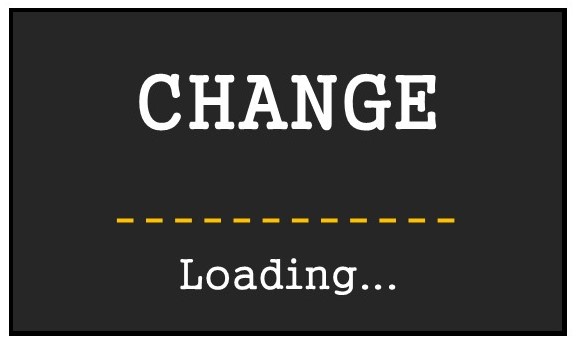I remember having to change elementary schools between 2nd and 3rd grade. It’s really quite amazing that it’s had such staying power in my brain, because as a 7-year-old, what was the big deal? But to this day, I remember being very nervous, feeling like I’d have no friends and wouldn’t be able to figure out my way around a new school. But as much as I remember the trepidation I had over this change, I also remember that my parents prepared me for the change. We made a trip to visit the school before the first day, I met my new teacher, and I was able to learn who the kids in my class were and took comfort in discovering I even knew a few of them. Of course, everything worked out just fine, but it’s funny how change can stir up every emotion, even if at the time we don’t understand why.
Change. What a dreaded word! Most people dislike change. Whether it’s the pain associated with implementing a change, the fear of change simply for the sake of change, or the unknown that change can bring about, it’s true that most dread change.
But why is that? In some cases, that is because change is not appropriately managed. In our research with over 1300 Controllers, one in five Controllers disagrees that change which may impact information provided to them is well-managed. Even if we aren’t happy with the way things are, we might still be “comfortable” because we know how to operate in our current environment. We would probably all agree that we cannot ever reach perfection, however, we can strive for continuous improvement. And continuous improvement only works if we are open to change and face it head on.
In control rooms, change management is essential. When a procedure is updated, the change should be briefed with Controllers and other control room personnel in advance when practical, trained in advance on simulators if necessary, and be implemented with a clear timeline. In some cases, it is also advisable to gather the opinions, inputs and concerns of Controllers and other impacted personnel in advance so that a sense of ownership regarding the change is achieved ahead of time. This same method or process should be the framework for any and all control room changes that might be considered – a shift schedule change, a change in assets on consoles, a SCADA system change, etc. And most importantly, whatever change is implemented, it should be done so in accordance with the change management section of your Control Room Management Plan.
Setting the mechanics of how to effectively implement change aside, change management must also involve how we mentally prepare ourselves and our teams for change. One of the great Philosophers, Socrates, once said, “The secret of change is to focus all of your energy, not on fighting the old, but on building the new.” If we hold on to the old way of doing things, we cannot fully focus our efforts and our energy on making the new way work. If we spend so much time grumbling and complaining, or even worse, spreading negative attitudes among our work team, we set ourselves up for failure before we even start. And if we do not seek to understand the reason behind the change, we will never embrace the change, and we will always stop short of operational excellence – which should be our goal.
As we approach another new year, what better time to set a new challenge for ourselves. So, shake off the old, and welcome the new! Never stop learning and growing! Strive for continuous improvement and operational excellence!
CRM and Philosophy | Christina Via © 2021 Please Distribute to Others.




